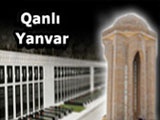|
|
TODAY.AZ / Voice of Diaspora
Azerbaijani-Americans remember the Black January
21 January 2011 [18:35] - TODAY.AZ
 Twenty-one years ago, on the night of January 19-20, 1990, the Soviet authorities staged the falling empire's last brutal crime against Azerbaijani people. Following a popular freedom movement on the rise in capital Baku, 26,000 regular and special troops with support of tanks, helicopters and navy stormed the city overnight, indiscriminately killing unarmed inhabitants.
Twenty-one years ago, on the night of January 19-20, 1990, the Soviet authorities staged the falling empire's last brutal crime against Azerbaijani people. Following a popular freedom movement on the rise in capital Baku, 26,000 regular and special troops with support of tanks, helicopters and navy stormed the city overnight, indiscriminately killing unarmed inhabitants.The "Black January" - as it came to be called - was the most violent crackdown on dissent during the Gorbachev's glanost era. According to the official counts, 137 civilians were killed that night alone (with up to 170 reported dead by February 1990) and 714 wounded.
In December 1990, the Human Rights Watch (HRW/Helsinki) and Inter-Republic Memorial Society sent an investigation team to Baku which found compelling evidence that Soviet troops "used unjustified and excessive forces resulting in unnecessary civilian casualties". The HRW / Memorial report included some striking findings that on the night of January 19-20, 1990, "heavily armed Soviet soldiers assaulted the city of Baku as though it was an enemy position intended for military destruction"; fired on clearly marked ambulances attempting to assist the wounded; strafed a civilian bus that posed no threat to soldiers; used armored vehicles to intentionally crush civilians; used weapons appropriate for warfare between sophisticated armies to randomly fire at civilian targets such as cars, residential yards and apartment buildings. Soviet troops used expanding bullets prohibited by the 1899 Hague Convention, killed women, children, and elderly among many others.
Although troops took control of the city, the Soviets have essentially lost Azerbaijan on January 20, 1990. Despite the curfew imposed by Soviet military, over 2 million people turned up for the mass funerals of the victims on the third day of massacre[4]. Black January became the turning point in Azerbaijani struggle for freedom and, within less than two years, in October 1991, Azerbaijan restored its constitutional independence.
Azerbaijan Society of America (ASA) and Azerbaijani-American Council (AAC) join all Azeri-Americans in remembrance of the victims and heroes of Black January.
/Today.Az/
URL: http://www.today.az/news/vdiaspora/79771.html
 Print version
Print version
Views: 4240
Connect with us. Get latest news and updates.
See Also
- 28 September 2024 [20:59]
Former German footballer fined for damaging neighbour’s garage with chainsaw - 15 June 2024 [20:46]
French company might lose its right to mine uranium in Niger - 15 June 2024 [19:10]
Sweden says Russian military jet violated airspace - 21 December 2023 [11:42]
USACC holds conference on role of Azerbaijani community in Washington - 02 June 2016 [13:39]
Does mental illness enhance creativity? - 24 February 2015 [21:40]
Diaspora stages Khojaly rally outside Canadian parliament - 15 January 2013 [11:07]
Azerbaijani Embassy in Moldova makes statement on 20 January tragedy - 08 January 2013 [10:50]
AYOR`s Astrakhan branch awarded - 27 December 2012 [10:36]
World Azerbaijanis Solidarity Day marked in Kiev - PHOTOS - 26 December 2012 [09:31]
Solidarity Day of World Azerbaijanis marked abroad
Most Popular
 Hornet's nest has been stirred up: how topic of Western Azerbaijan scared revanchists
Hornet's nest has been stirred up: how topic of Western Azerbaijan scared revanchists
 Huawei debuts new smartphones and devices in Argentina
Huawei debuts new smartphones and devices in Argentina
 Azerbaijan, Turkiye sign pact to strengthen military security
Azerbaijan, Turkiye sign pact to strengthen military security
 Russia open to consultations on TRIPP initiative with Armenia
Russia open to consultations on TRIPP initiative with Armenia
 Why Iran fears Corridor that Armenia sees as lifeline
Why Iran fears Corridor that Armenia sees as lifeline
 PM Asadov mulls regional co-op and North-South corridor with Astrakhan governor
PM Asadov mulls regional co-op and North-South corridor with Astrakhan governor
 President Ilham Aliyev addresses participants of 8th Congress of Azerbaijan Trade Unions Confederation
President Ilham Aliyev addresses participants of 8th Congress of Azerbaijan Trade Unions Confederation
